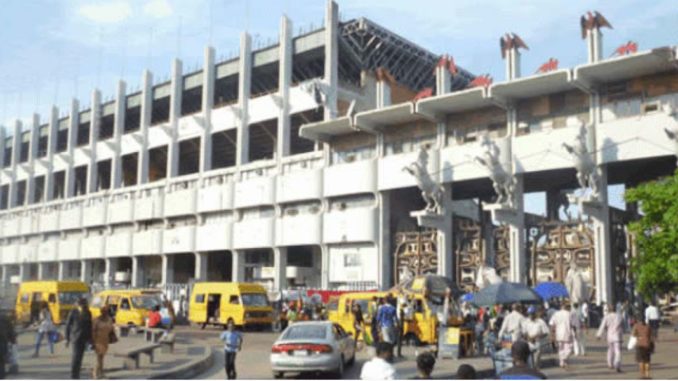
Regarded as Nigeria’s premier exhibition, the Lagos International Trade Fair is rapidly becoming a jot in the memory. Its deterioration reflects brutally in the condition of the Lagos International Trade Fair Complex, which normally is the venue for the event. The complex, having suffered neglect and exposure to a dubious concession, is currently diminished. Consequently, the fair has been returned to the Tafawa Balewa Square, a setting that is far smaller. Therefore, it is appropriate for the Bureau of Public Enterprises – the government agency entrusted with such national assets – to step in firmly and recreate its allure.
A recent closure of the complex, which was prompted by a protest by the traders operating there, has triggered a flurry of activities, bringing to the surface the undefined tenancy of the occupiers. Alleging that government was about to sell off the complex, the traders’ union mobilised its members to protest against the move. In response, the BPE denied the “purported” sale and stated that it was pressing ahead with a fresh plan to concession the complex again.
To attain this objective, the bureau appointed a consultant (Messrs Feedback Infrastructure Services) “to advise it on the way forward.” This is rightly so, as the initial lease arrangement with Aulic Nigeria has turned awry. Sanctioned in 2007, all the deal achieved was to exile the annual fair to the TBS. Certainly, this was far from being government’s intention then when it valued the concession at N40 billion and was to be paid over 30 years.
Now, government has lost money on the deal. In revoking the concession in 2017, the BPE stated that the concessionaire defaulted on its contractual obligations. Among other claims, it allegedly owed N6.5 billion as rent collected, sub-leased the premises to third parties and had no management structure in place, all contrary to the terms of the agreement. Aulic denies these accusations, arguing that the National Council on Privatisation, chaired by Vice President Yemi Osinbajo, wrongly terminated the contract.
Apart from the financial losses, it is indisputable that the purpose of the concession has been defeated. Nowadays, all manners of business operate there, contrary to the vision of the founders. The international business community has lost interest. This is scandalous.
Established during the oil boom years, the LITFC was conceptualised to go with the economy that was growing rapidly then. With the Lagos State Government, the Federal Government and the Lagos Chamber of Commerce and Industry collaborating on it, the fair offered a profitable platform for manufacturers, suppliers, buyers and users of a wide range of goods and services, as well as opportunities for investment and trade promotions. As with most Nigerian things, it did not last.
The current mess at the LITFC is an indictment of the government and its agencies, particularly the BPE and the NCP. Government lost a good opportunity to revive the LITFC in 2017 when the NCP revoked the agreement over alleged violations. In spite of this, the concessionaire continues there with business as usual. Alex Okoh, Director-General, BPE, lamented the agency’s inability to eject the concessionaire despite the NCP’s revocation order. This is unacceptable. Is the concessionaire more powerful than the government?
Coincidentally, the LITFC is not the only national asset wasting away. In Lagos alone, the National Arts Theatre, the National Stadium and the Federal Secretariat, have either been abandoned or struggling to get by. Ditto for the National Stadium, Abuja. It is hard to comprehend this anomaly in the context of the downturn in the economy.
In the same vein, Nigeria’s steel industry has yet to take off because the Ajaokuta Steel Company and the associated mills in Delta, Osun and Katsina states are virtually lying fallow decades after their establishment. In some of these companies, asset stripping is the prevalent order. This has obviated the noble goals of their sales or concession. Primarily, this is to boost commerce, make them job spinners and investors’ delight.
Conversely, perceptive governments around the world appreciate the economic value of trade fairs. With a turnover of $60 billion (2014), the Canton Fair, in Guangzhou, has assumed an important place in the Chinese economy, official records stated. The largest fair there, it holds in April, May, October and November annually. Apart from this, the East China Import and Export Commodity Fair, Shanghai, records an annual turnover of $2.6 billion promoting manufacturing, craft, trade, and jobs and attracting visitors from around the world.
This is the time to end the disarray in which the LITFC has found itself and restore it to its pre-eminence in the sub-region. The BPE should give the Lagos International Trade Fair a new lease of life. Having lost much ground, it should call for bids from reputable international companies in that sector, who possess the financial muscle to rebuild the shabby infrastructure at the complex and profitably manage it. Through inviolable agreements, the BPE should impress it on the winning bid not to deviate from the original ideals that informed the LITFC creation.
END

Be the first to comment